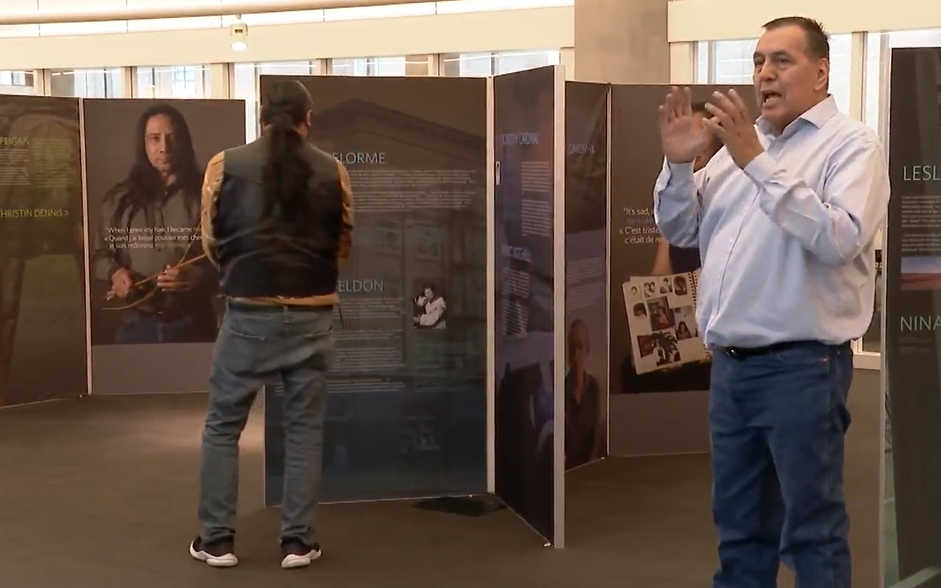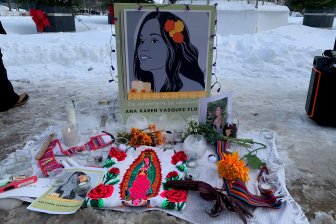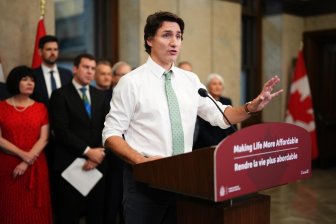Warning: This story deals with disturbing subject matter that may upset and trigger some readers. Discretion is advised.

A travelling exhibit focused on truth and reconciliation has made its way from Alberta to the Vancouver Public Library. The exhibit, called ‘Bi-Giwen: Coming Home — Truth Telling from the Sixties Scoop,’ is an initiative of the Sixties Scoop Indigenous Society of Alberta.
It opened Saturday in Vancouver and will remain until Tuesday, before it is packed up for display elsewhere.
“The histories, memories and impacts of the Sixties Scoop are complex,” said Sixties Scoop Indigenous Society of Alberta president and survivor Sandra Relling at the launch.
“What’s clear though is the pain, grief and loss that survivors have and continue to live with. This exemplifies a strong need for healing for survivors. We’re beginning to speak our truth.”
The Sixties Scoop refers to a period between the 1950s and 1980s, after amendments to the Indian Act let provincial governments take over Indigenous child welfare. Thousands of First Nations, Inuit and Métis were taken from their birth families, usually without consent, and placed in non-Indigenous homes.
They were stripped of their language and culture, and left with complex questions about their identity, “feeling that they belonged neither in the Indigenous, nor non-Indigenous worlds,” said Relling. Many faced extreme forms of physical, sexual, mental and spiritual abuse.
Bi-Giwen is the first exhibit of its kind in Canada, Relling added, featuring the oral testimonies of 12 survivors of the scoop. It also includes replicas of canvasses from engagement sessions with survivors in Alberta leading up to the provincial government’s formal apology in 2018.
The originals are held at the Royal Alberta Museum, where discussions about creating a permanent Sixties Scoop exhibit are now underway.

The Vancouver launch was attended by local survivors, elders, volunteers and politicians, along with members of the Sixties Scoop Indigenous Society of Alberta. Staff were on hand to help any visitors cope with resurfacing pain and trauma.
Relling urged other guests who may feel “guilt and shame” while browsing the exhibit to “channel” their emotions into action.
“Speak up even if your voice shakes. It’s critical to our healing and reconciliation,” she said.
“The most important thing you can do is acknowledge what happened, honour the survivor and ensure that we all take action, today, to eliminate racist views by educating people about this history and its ongoing impacts.”
The Manitoba government apologized for its role in the Sixties Scoop in 2015. The Alberta government followed suit in 2018, and Saskatchewan Premier Scott Moe did the same in 2019.
On Saturday, Sixties Scoop Indigenous Society of Alberta board member Adam North Peigan called on B.C. Premier John Horgan to do the same in the B.C. legislature.
“It has not happened in B.C.,” he lamented, pointing to the politicians and journalists in the crowd.
“Each of you that have influence … you need to encourage the B.C. government to issue an apology to make it a Western Canada movement.”

The Vancouver Public Library said Saturday it was pleased to host the exhibit as part of its commitment to decolonizing public institutions in Canada.
The library regularly features indigenous collections, authors, speakers, film screenings and workshops, and has an Indigenous story teller-in-residence.
Speaking from her own personal experience studying for the Canadian citizenship test, Vancouver Public Library board member Abeer Yusuf said the Sixties Scoop is nowhere to be found in the guide.
“It’s quite heartbreaking for me that is not acknowledged or mentioned anywhere, but obviously it’s a critical part of our history and how we came to be,” she said.
The Hope for Wellness Help Line offers culturally competent counselling and crisis intervention to all Indigenous peoples experience trauma, distress, strong emotions and painful memories. The line can be reached anytime toll-free at 1-855-242-3310.
- 1 hospitalized, Coquihalla Highway traffic restricted south of Merritt after crash
- Stolen Border Collie Zoey recovered, vehicle still missing from New Westminster
- ‘Sent from my iPhone’: Public warned of extra deceptive gift card scam
- Burst pipes due to extreme cold overwhelm B.C. emergency services, restoration companies




Comments